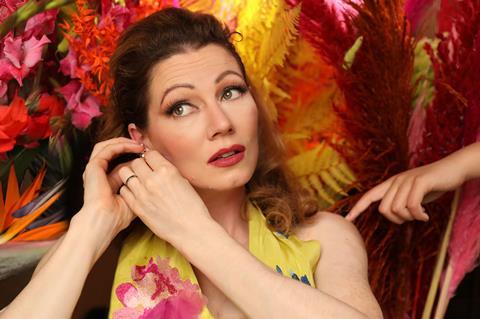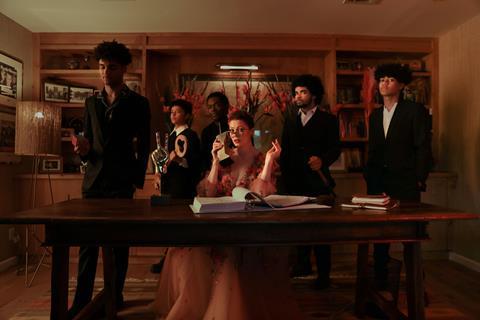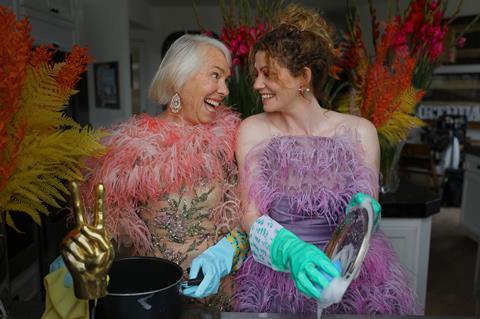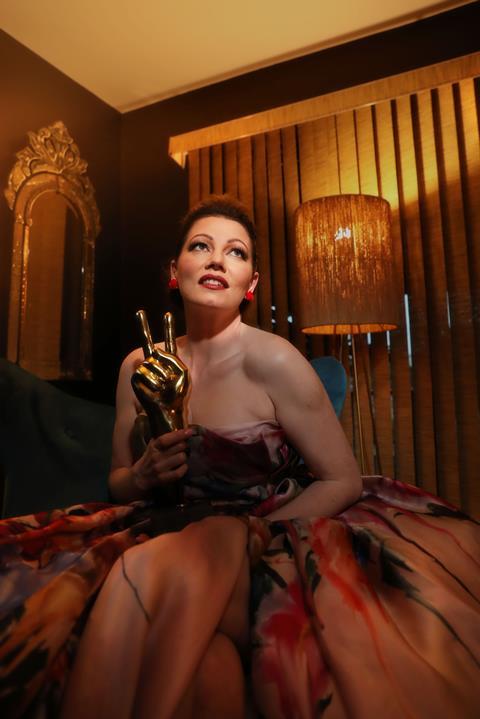Actress and singer-songwriter Jessica Oyelowo spoke with Muyiwa Olarewaju, head of Premier Gospel, about stepping away from the limelight to support her family, the struggle for her identity – and why she wanted to honour motherhood in her latest album

Muyiwa Olarewaju (MO): Most people know your husband, David, for all these great roles. And there are also those who know you for your work as an actress. But it seems you made a decision to focus on being a mother and homemaker – why?
Jessica Oyelowo (JO): When I first became a mum I was 23, and I was working all the time. I had another baby three years later, and I continued to work. When we lived in the UK I was working as an actress in plays, film and TV and we had a nanny. There’s no way we could have done it without help. But when we moved to America it was such a different industry. There is so much going on in Hollywood; there is fierce competition. I realised: “I don’t understand this business.” Also, I was pregnant a month after we arrived, my agent retired, I fired my team because I found out there were things going on that I didn’t agree with. So, I was suddenly pregnant with a third child with no management, no agent, no team. I just thought: “I’m going to take some time out. Everybody needs mummy right now.”
We have to start deciding that we’re going to honour motherhood in a fresh way so that there is a safe space to speak about these things
MO: Were you comfortable doing that? Because most people dream about being in Hollywood?
JO: I trust God with my every breath. So, if he has a different plan for me right now, that’s what I’m going do. But there was also quite a lot of fear in me, being in Hollywood. I’m a talented actress; I can inhabit a character. But what seemed even more important to people was how I looked while I played that character. And that is not who I am. This was 16 years ago, and everything was sexy librarian, sexy scientist, sexy, whatever. That’s not who women are! It’s very important to me that I put things out into the world that are edifying even if I’m playing a difficult character or an evil character; the story itself is doing something for good.

I was 29 years old with three kids. And Hollywood was like: “We don’t know what to do with you. You’re too young to play the mother. And you’re kind of the right age to play the sexy girlfriend but you’re a mum.” I needed to dig in and get very rooted and grounded before I could possibly have the opportunity to be true to who I am and to who God is in me with the crazy, buzzing environment that we then found ourselves in.
MO: How long did that journey take you? And what were some of the things that you found on the way?
JO: I’m going to be on that journey for the rest of my life! I had to deal with a lot of jealousy. I was married to a man whose star was rising while I was at home, wiping up poopy butts. In the UK, we had been working together; he did a film, I did a film, I did a TV show, he did a play, he did a TV show, I did a play. We were very together in our career trajectory. And for it all to stop, I definitely had a bunch of identity crises. There was no way it was going to be easy. But I’m not someone who takes easy. I hear there’s a road that’s broad and wide and easy. And I’m like: “I’m not taking that road; I’m going to take the narrow path that leads to life.” And that narrow path is never easy. Let’s expect it to be difficult.

I’ve been praying Psalm 139 over myself for years: “Search me O God…try me…see if there is any wicked way in me, and lead me in the way everlasting” (NKJV). I can trick myself into thinking that I’m good, that I’m godly. I’ve got it all. But search my heart, oh God, because my heart is wicked and deceitful. I need you to love me, I need you to show me where I am not godly, where I am not OK, where I’m holding on to sin, and to self. ‘Death to self’ kind of became my mantra. I was like: “There is no other way.” I stopped working, and homeschooled our children. I took everybody out of the systems.
MO: You’re talking about things that even people who are not in Hollywood are going through, where one partner seems to be excelling and the other says: “You’re living your dreams while I’m here”, and that causes a huge fracture. But here you are, in Hollywood, 25 years of marriage. You’re saying you had to focus on yourself, and be honest with your own frailties?
JO: Absolutely, but in this world, I think we’ve got our values muddled up. A pursuit of dreams and excelling in the world and having money or success is where we place our value. I had to dig down into the place of my value being found in the one that never changes. His value system never changes. He always loves, he always cares for, he always gives. And it was an impossibly difficult journey. You’re literally putting to death the works of the flesh, and you are finding yourself in a space where you can say: “My value is not in my outward success. My value is in who God is in me, not even who I am in Christ. I am not the point here. He is the point; he is the reason.” If he can become your everything, then your value system is fully realised.
One of the big reasons I wanted to write this album was because mothers have been so devalued. It’s the most important thing we can do. It’s so sacrificial, it’s so all-consuming, but we don’t value the women who are giving up their lives to do this. I wanted to tell my own story through this album, to honour, empower and respect mothers and motherhood. I have discovered, too, how motherly and kind God is through this journey.
MO: Some of the album, (M)other, talks about the real pain of motherhood, doesn’t it?
JO: Honestly, those challenges usually happen in secret. They happen when mothers are alone. They happen in the middle of the night. They happen while she’s miscarrying. They happen while she’s having an identity crisis. They happen while she’s struggling to love the children who are being so rebellious and annoying and just impossible. Sometimes the only moment you have to yourself is when you can finally get to the restroom [sic] and just sit peacefully and pray that they don’t bang on the door. I wanted to be honest about the journey because I know every mother goes through this but we feel alone, because these things happen in private. We have to start deciding that we’re going to encourage one another, that we’re going to honour motherhood in a fresh way so that there is a safe space to speak about these things.
MO: Another thing you explore on the album is identity. I’ve seen famous couples like you and your husband, and noticed how the crowds clamour for the person in the limelight and totally shun the other person. I’m assuming you’ve experienced some of that?
JO: Well, for the longest time, I felt like my name was actually ‘plus one’. It wasn’t Jessica Oyelowo. David would be invited to everything and he was allowed to bring a guest and even people who knew us wouldn’t put my name on the invitation. They put ‘plus one’. I’ve had a long time of feeling ‘other’, which is why there are brackets around the M in the word (M)other on the album. My process of that journey is in the song ‘Birdsong’: “How many times do I have to say the same thing before you hear me? How many times do I have do the same thing for you notice me, I feel like a bird in a cage. I’m singing for freedom. But the more I sing, the more I’m in a cage.” That’s what I wrote in the middle of feeling like I was unimportant. I no longer mattered, because I was just a mother. I was just a wife.
I had to start choosing to see myself rightly
We had dinner with President Barack Obama and First Lady Michelle Obama. I had nothing to say. I felt like such an idiot in that room. It was a private dinner with only about twelve people there. There was Oprah Winfrey, there was Gayle King, there were a couple of senators. And I was like: “What do I do? What do I say? Who am I? I’ve got nothing to say.” Then I realised, I was choosing to not have an identity. I was choosing to not participate in those conversations, I was choosing to feel like a plus one. I had to choose to stop putting my value in worldly success. I had to start choosing to see myself rightly, the way God sees me. So, I chose to repent.

MO: Is that what you capture on ‘Soften my heart’?
JO: Absolutely. The Bible goes on and on about hard hearts, and that God resists the proud. What is pride? It’s a hard heart. If you have a hard heart, you are proud. And I had a hard heart. I’m not all evil, you know. I was nice. And I was absolutely supporting David. But God is not looking at outward appearances. He’s looking at the heart – and mine was hard and resentful. But repentance is the most healing balm for all of our lives. It’s the gift of God through Jesus on the cross. It’s everything. Repent, turn to him and be loved, be forgiven, be whole; be found in him rather than in yourself. When we try and figure it all out for ourselves, we never get it right. We can’t.
This interview can be heard in full on Premier Christian Radio, live at 8pm on Saturday 5 August or download ‘The Profile’ podcast premierchristianradio.com/theprofile






























No comments yet